13 Science-Backed Health Benefits of the Ketogenic Diet You Need to Know
Unlock a healthier you with this in-depth look at how the keto diet can transform your body and mind, backed by science.
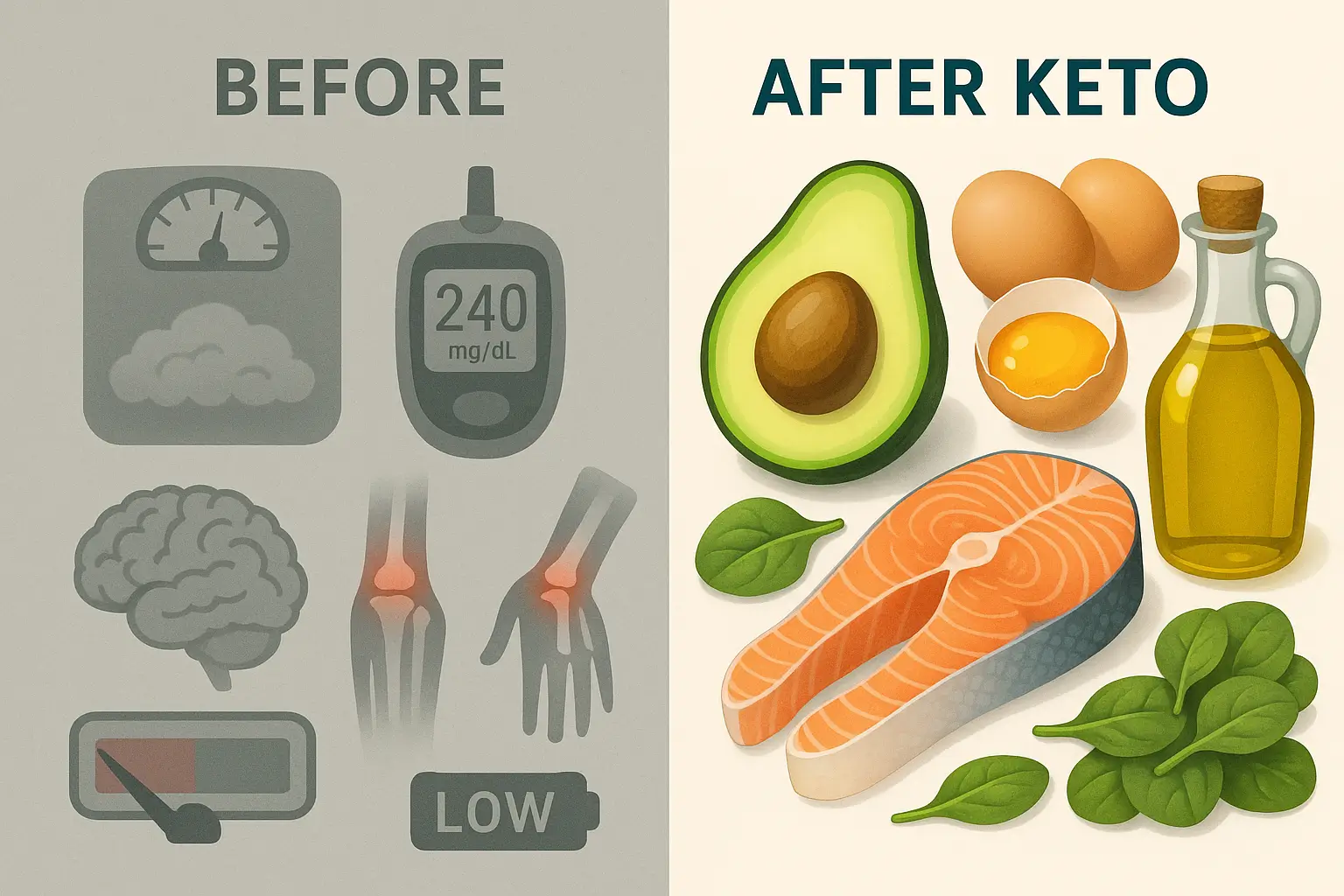
The ketogenic diet requires a radical shift in your eating patterns. You eat 70-80% of your calories from fat, 15-25% from protein, and just 5-10% from carbohydrates [1]. This dramatic change forces your body into ketosis, a metabolic state where you burn fat for fuel instead of glucose.
Your liver converts fat into molecules called ketones when carbohydrate intake drops below 50 grams daily [2]. These ketones become your primary energy source, powering everything from your muscles to your brain. The result is a complete metabolic transformation that scientists have studied for nearly a century [3].
This comprehensive guide examines 15 science-backed health benefits of the ketogenic diet. Each benefit comes with supporting research and practical insights for implementing this approach. You’ll discover how ketosis affects weight loss, brain function, heart health, and chronic disease management through documented clinical studies and real-world applications.
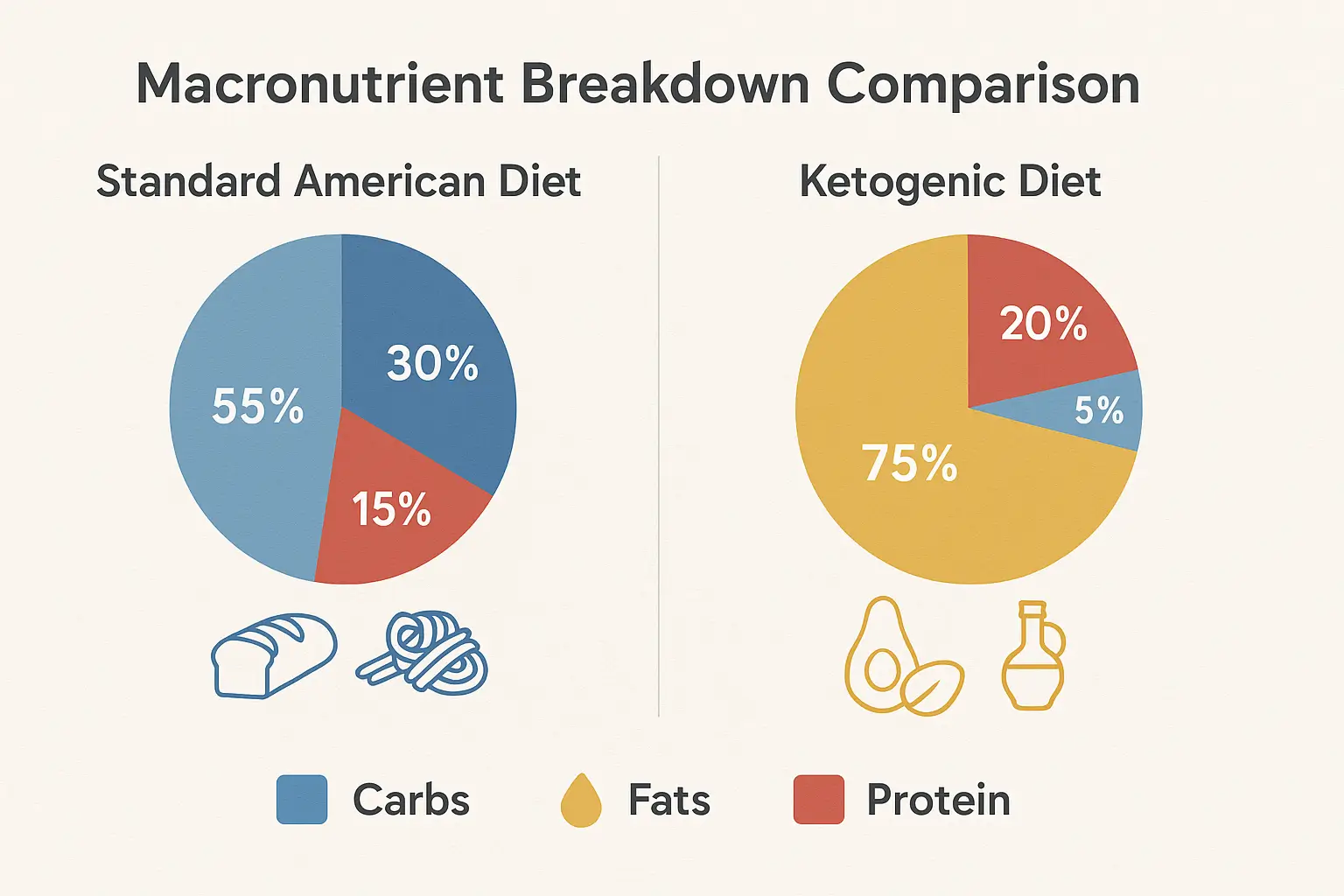
1. Promotes Significant Weight Loss
The ketogenic diet creates powerful conditions for fat loss through multiple metabolic pathways. Your body shifts from glucose to ketones as its primary fuel source, leading to increased fat oxidation throughout the day. Research shows people on keto diets lose 2.2 times more weight than those on low-fat diets over a 24-week period [4].
The initial weight drop happens fast, often 5-10 pounds in the first week alone. This rapid loss comes from depleted glycogen stores and water weight, not just fat tissue. Each gram of stored carbohydrate holds 3-4 grams of water, so when you burn through these reserves, the scale drops quickly [5].
Beyond the initial phase, sustained fat loss occurs through multiple mechanisms:
- Increased fat oxidation throughout the day means your body continuously burns stored fat for energy, even during rest periods.
- Higher metabolic rate from processing protein and fat requires more energy expenditure than carbohydrate metabolism, burning an extra 80-100 calories daily.
- Reduced fat storage due to lower insulin levels prevents your body from converting excess calories into stored body fat.
- Spontaneous calorie reduction from appetite suppression leads to eating 200-300 fewer calories daily without conscious restriction.
A 2013 meta-analysis of 13 randomized controlled trials found that people following ketogenic diets lost an average of 2 pounds more than those on low-fat diets over one year [6].
The difference becomes even more pronounced in studies lasting longer than 12 months, with some participants maintaining 10% body weight loss after two years.
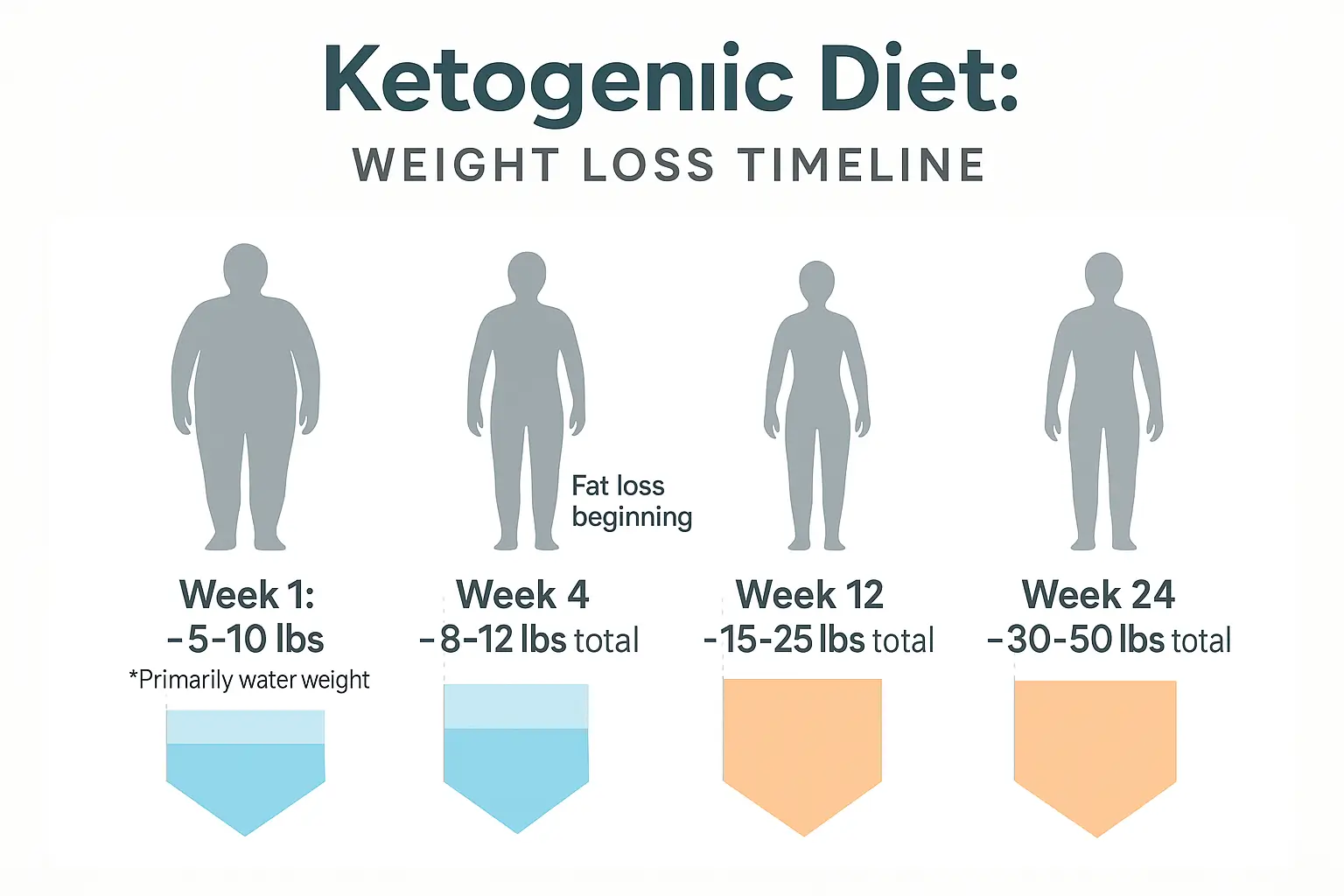
2. Reduces Appetite and Curbs Cravings
“Why don’t I feel hungry anymore?” This common question from new keto dieters has a scientific answer rooted in hormonal changes.
Ketogenic diets increase production of cholecystokinin (CCK), a hormone that signals fullness to your brain [7].
They simultaneously reduce ghrelin, the hormone that triggers hunger sensations. This hormonal shift means you naturally eat less without counting calories or fighting constant cravings. Studies show participants report feeling satisfied on 200-300 fewer calories per day when following a ketogenic diet [8].
Stable blood sugar plays a crucial role in appetite control. Without the rapid rises and falls in glucose from high-carb meals, your energy stays consistent throughout the day. You avoid the 3 PM energy crashes that typically demand sugary snacks. Late-night hunger pangs disappear when blood sugar remains steady.
The protein component matters significantly for satiety. Studies demonstrate that protein reduces appetite more effectively than carbohydrates or fat alone [9].
When you combine adequate protein intake (0.8-1.2 grams per pound of lean body mass) with the satiating effects of dietary fat, hunger becomes manageable rather than overwhelming.
3. Improves Blood Sugar Control and Insulin Sensitivity
Your blood sugar stabilizes dramatically when you remove most carbohydrates from your diet. Carbohydrates convert directly to glucose in your bloodstream, so removing them naturally lowers blood sugar levels. This effect happens within days of starting the diet.
The numbers demonstrate remarkable improvements. One study found that 95% of type 2 diabetics reduced or eliminated their glucose-lowering medications within six months on a ketogenic diet [10]. Another showed average blood sugar reductions of 30-50 mg/dL in the first few weeks [11].
Insulin sensitivity improves alongside blood sugar control. Your cells become more responsive to insulin signals, requiring less of this hormone to manage glucose.
This improvement happens through several mechanisms:
- Lower glucose intake means less insulin production, giving your pancreas a chance to recover and reset.
- Reduced body fat improves cellular insulin response, particularly when you lose visceral fat around organs.
- Ketones provide alternative fuel, reducing glucose dependence and allowing insulin receptors to resensitize.
- Inflammation decreases throughout the body, enhancing insulin signaling at the cellular level.
(Ed. note: These improvements often occur within weeks, faster than most diabetes medications achieve similar results, though medical supervision remains essential for anyone with diabetes.)
The American Diabetes Association now includes low-carb diets as an evidence-based option for diabetes management, acknowledging their effectiveness for blood sugar control [12].
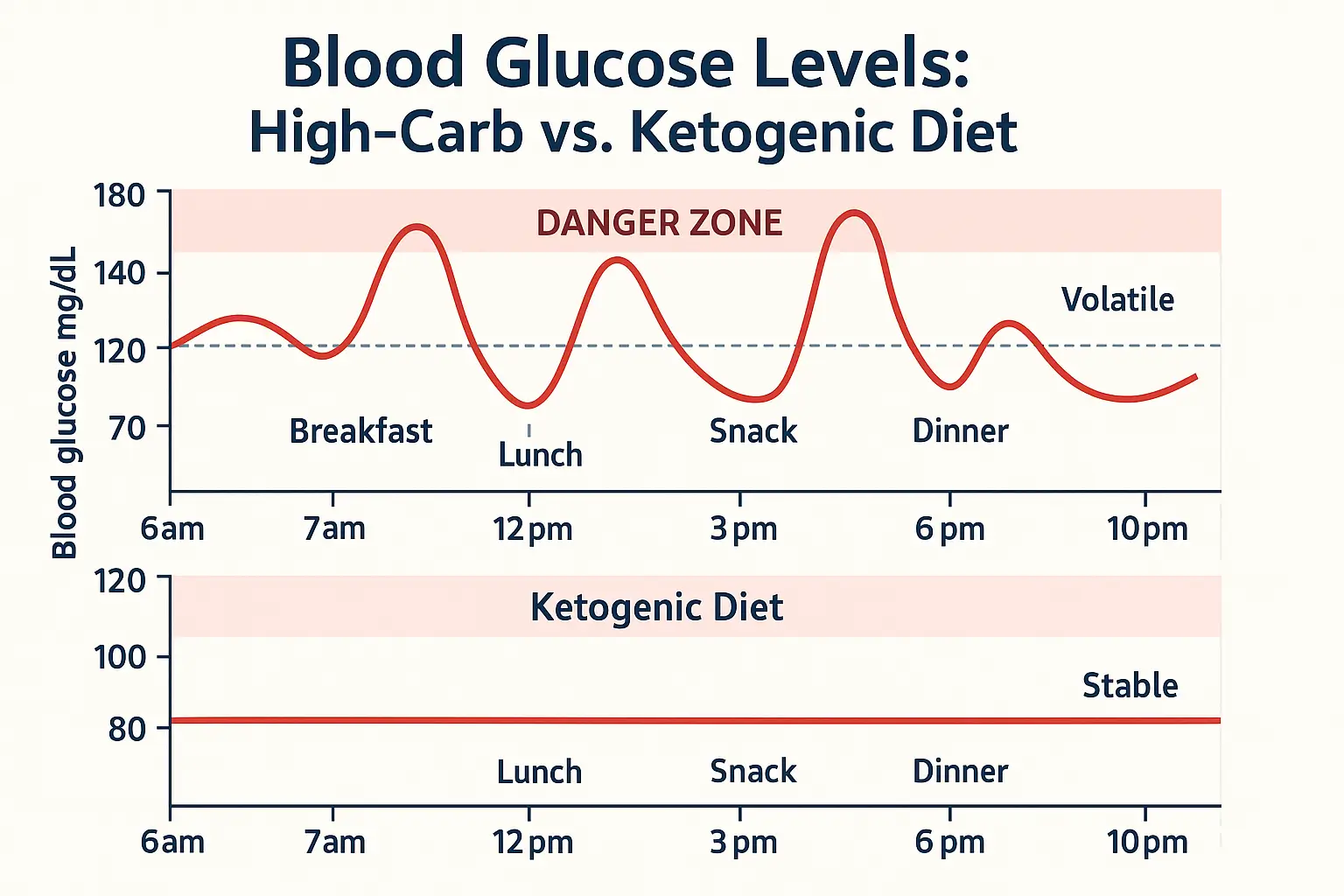
4. Fights Metabolic Syndrome
Metabolic syndrome affects one in three American adults [13]. This cluster of conditions includes high blood pressure, elevated blood sugar, excess belly fat, and abnormal cholesterol levels. Together, they dramatically increase your risk of heart disease, stroke, and type 2 diabetes.
The ketogenic diet addresses all five diagnostic criteria of metabolic syndrome simultaneously [14]:
- Waist circumference decreases through targeted abdominal fat loss, with studies showing 2-3 inch reductions within 12 weeks.
- Fasting glucose drops within days of starting the diet, often normalizing within 2-4 weeks of consistent ketosis.
- Blood pressure normalizes as inflammation reduces and excess water weight drops off the body.
- Triglycerides plummet by 20-50% or more as your liver stops producing excess fat particles from carbohydrates.
- HDL cholesterol rises by 10-15%, improving your cardiovascular risk profile significantly.
A 2008 study followed 40 subjects with metabolic syndrome for 12 weeks. Those on a ketogenic diet saw improvements in ALL metabolic syndrome markers, while the low-fat diet group improved in only two areas [15].
The mechanism centers on reduced insulin levels. Lower insulin allows your body to release stored fat, particularly the dangerous visceral fat surrounding your organs. This fat loss directly improves all metabolic health markers simultaneously.
5. May Improve Cholesterol and Triglyceride Levels
Your cholesterol profile often improves dramatically on a ketogenic diet, though individual responses vary. Triglycerides typically drop by 20-50% within the first month, while HDL (protective) cholesterol rises by 10-15% [16].
“But what about LDL cholesterol?” This valid concern deserves a nuanced answer.
LDL responses vary more between individuals than other markers. Some people see decreases of 10-20%, others see increases of similar magnitude. However, the TYPE of LDL particles matters more than the total amount.
Ketogenic diets tend to shift LDL particles from small, dense varieties (which penetrate arterial walls easily) to large, buoyant varieties (which are less likely to cause arterial damage) [17].
Recent research from the Journal of Clinical Lipidology found that 70% of people on ketogenic diets experienced improved overall cardiovascular risk markers despite increased LDL in some cases [18].
The key lies in examining the complete lipid picture:
- Triglyceride to HDL ratio should fall below 2.0, with many achieving ratios under 1.0.
- LDL particle size and number matter more than total LDL cholesterol concentration.
- Inflammation markers like C-reactive protein typically decrease by 30-40%.
- Blood pressure improvements contribute to overall cardiovascular risk reduction.
Your doctor can order advanced lipid panels (such as NMR LipoProfile or Cardio IQ) to assess these factors comprehensively. Standard cholesterol tests provide incomplete information about cardiovascular risk.
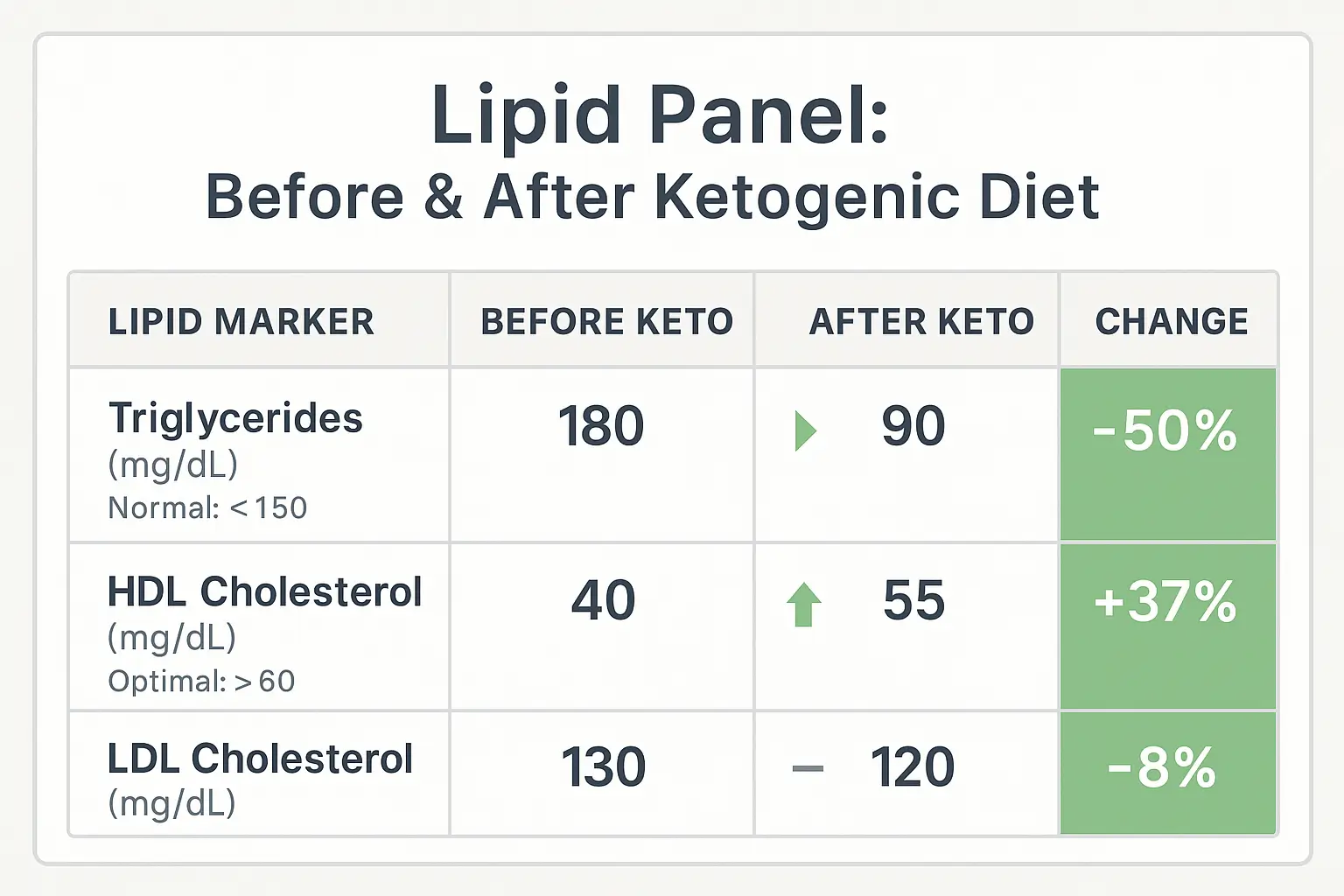
6. Can Lower Blood Pressure
High blood pressure affects nearly half of American adults [19], yet many don’t realize how quickly dietary changes can help. The ketogenic diet reduces blood pressure through several distinct pathways.
First, you lose excess water weight in the initial weeks of the diet. Less fluid volume in your circulatory system means less pressure on your arterial walls. One study showed average systolic blood pressure drops of 10-15 mmHg within the first month [20].
Second, insulin reduction plays a major role in blood pressure regulation. High insulin levels cause your kidneys to retain sodium, increasing blood pressure through fluid retention. When insulin drops on keto, your kidneys release this excess sodium and water naturally through increased urination.
The diet also reduces inflammation in blood vessels, improving their flexibility and function. Spanish researchers found that participants following a ketogenic diet for 12 weeks reduced their blood pressure medication needs by 50% on average [21].
Weight loss contributes additional benefits. Every 10 pounds lost typically reduces systolic blood pressure by 5-20 mmHg [22]. Combined with the other mechanisms, many people achieve normal blood pressure readings without medication within 3-6 months.
7. Enhances Mental Clarity and Focus
Your brain operates differently on ketones compared to glucose. While it typically uses glucose for energy, your brain actually processes ketone bodies more efficiently, requiring less oxygen to produce the same amount of ATP (cellular energy) [23].
This efficiency translates into noticeable cognitive benefits that many people report within 2-3 weeks of achieving stable ketosis.
People consistently report clearer thinking, better focus, and improved memory after adapting to ketosis. The science supports these subjective experiences.
Ketones provide steady fuel without the fluctuations that occur with glucose metabolism. Consistent energy supply means stable mental performance throughout the day without afternoon cognitive decline.
Research from the University of Cincinnati found that older adults with mild cognitive impairment showed significant memory improvements after just six weeks on a ketogenic diet [24].
Brain scans revealed increased blood flow to memory centers and enhanced neural connectivity between brain regions.
The cognitive mechanisms include several factors working together:
- Increased production of brain-derived neurotrophic factor (BDNF) supports new neural connections and protects existing brain cells.
- Enhanced mitochondrial function in brain cells improves cellular energy production and reduces oxidative damage.
- Reduced brain inflammation allows better neurotransmitter function and clearer signal transmission.
- Improved neurotransmitter balance, particularly increased GABA production, reduces anxiety and improves focus.
High-performing professionals in demanding fields have embraced ketogenic diets specifically for these cognitive benefits. They report sustained mental energy throughout long workdays without needing constant caffeine consumption.
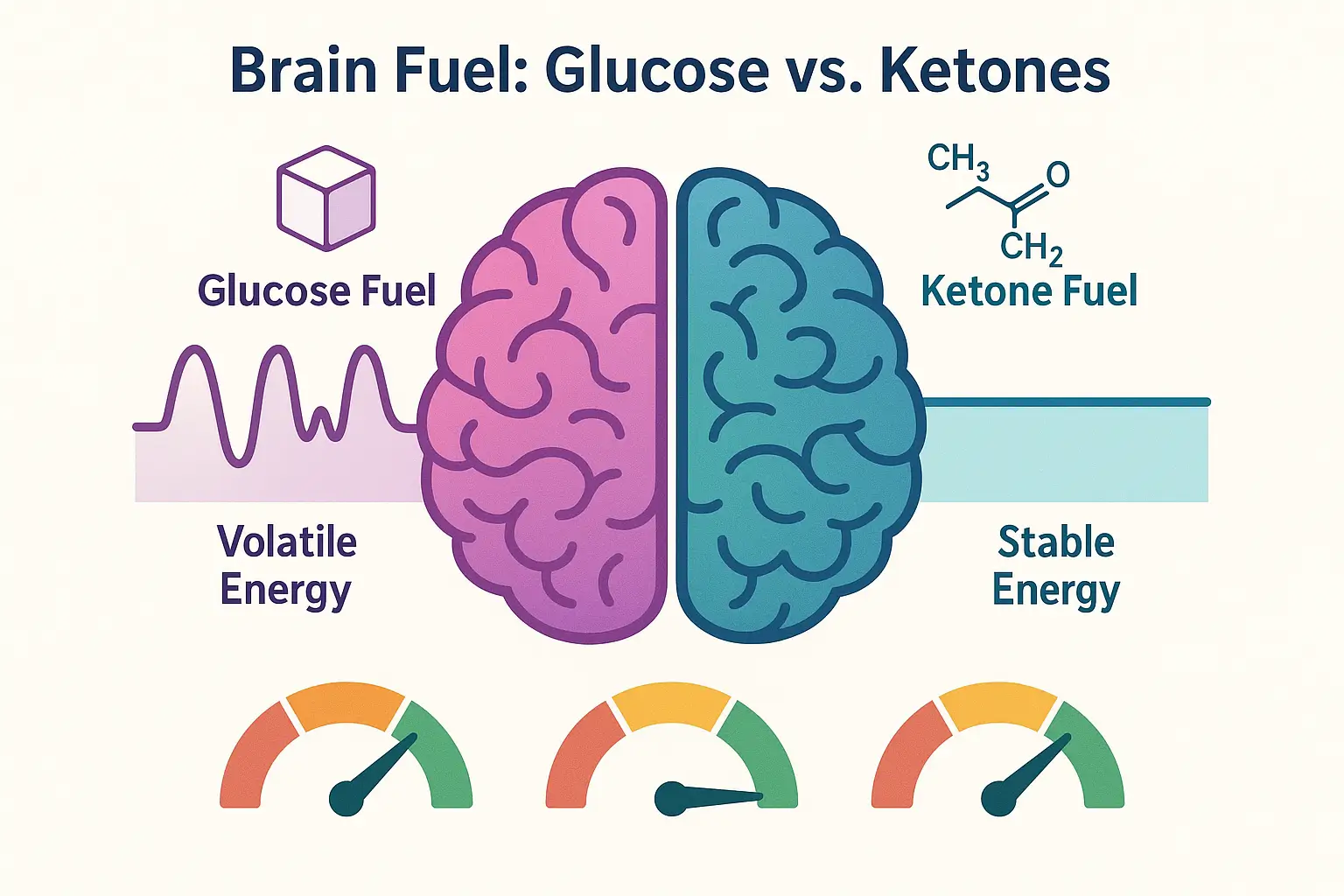
8. Offers Neuroprotective Benefits
The ketogenic diet started as a medical treatment for epilepsy in the 1920s at Johns Hopkins Hospital. Doctors discovered that fasting reduced seizures, and the diet mimicked fasting’s therapeutic effects. Today, it remains a proven therapy for drug-resistant epilepsy, particularly in children who don’t respond to medications [25].
The diet reduces seizures in 50% of patients and eliminates them entirely in 15% of cases [26]. These results often surpass those of anti-epileptic drugs, without the cognitive side effects common to seizure medications.
Beyond epilepsy, research explores ketogenic benefits for other neurological conditions:
- Alzheimer’s Disease: Ketones provide alternative fuel when glucose metabolism fails in aging brains. Brain cells in Alzheimer’s patients lose the ability to use glucose effectively, but they can still use ketones. A 2019 randomized controlled trial showed cognitive improvements in Alzheimer’s patients following a modified ketogenic diet for 12 weeks [27].
- Parkinson’s Disease: Small clinical studies indicate symptom improvements in Parkinson’s patients, including better motor function and reduced tremors. Participants showed 43% improvement on the Unified Parkinson’s Disease Rating Scale after 28 days [28].
- Traumatic Brain Injury: Animal studies show faster recovery and reduced brain damage when ketones are available post-injury. Human trials are currently underway at several major medical centers [29].
- Multiple Sclerosis: Preliminary research suggests reduced fatigue and improved quality of life scores in MS patients following ketogenic diets for six months [30].
The neuroprotective mechanisms involve reduced oxidative stress, improved mitochondrial function, and decreased brain inflammation. While research continues expanding, the potential for treating neurological conditions through dietary intervention rather than pharmaceutical drugs excites both researchers and patients seeking alternatives.
9. Reduces Inflammation
Chronic inflammation underlies most modern diseases, from arthritis to heart disease to cancer. The ketogenic diet combats inflammation through multiple interconnected pathways that work throughout your body.
Beta-hydroxybutyrate (BHB), the primary ketone your body produces during ketosis, directly blocks the NLRP3 inflammasome – a protein complex that triggers inflammatory responses throughout your body [31].
This blocking action reduces production of inflammatory signaling molecules called cytokines, which cause pain, swelling, and tissue damage.
“Does this mean my joint pain will improve?”
Many people with inflammatory conditions experience significant relief within weeks.
You also eliminate major dietary inflammatory triggers when following a proper ketogenic diet:
- Refined sugars that spike insulin and inflammatory markers disappear from your meals completely.
- Processed grains that can damage gut lining and trigger immune responses are eliminated entirely.
- Industrial seed oils high in omega-6 fatty acids are replaced with anti-inflammatory fats like olive oil and fish oil.
- Food additives and preservatives common in processed foods are naturally avoided on whole-food ketogenic diets.
C-reactive protein (CRP), a key inflammation marker measured in blood tests, drops by 30-40% on average within eight weeks of starting a ketogenic diet [32].
People with inflammatory conditions often report dramatic improvements in symptoms like joint pain, skin conditions, digestive issues, and chronic fatigue.
A 2018 study in the journal Cell Metabolism found that ketogenic diets reduced inflammation markers more effectively than low-fat diets, even when both groups lost similar amounts of weight [33].
This suggests the anti-inflammatory effects come from ketosis itself, not just weight loss.
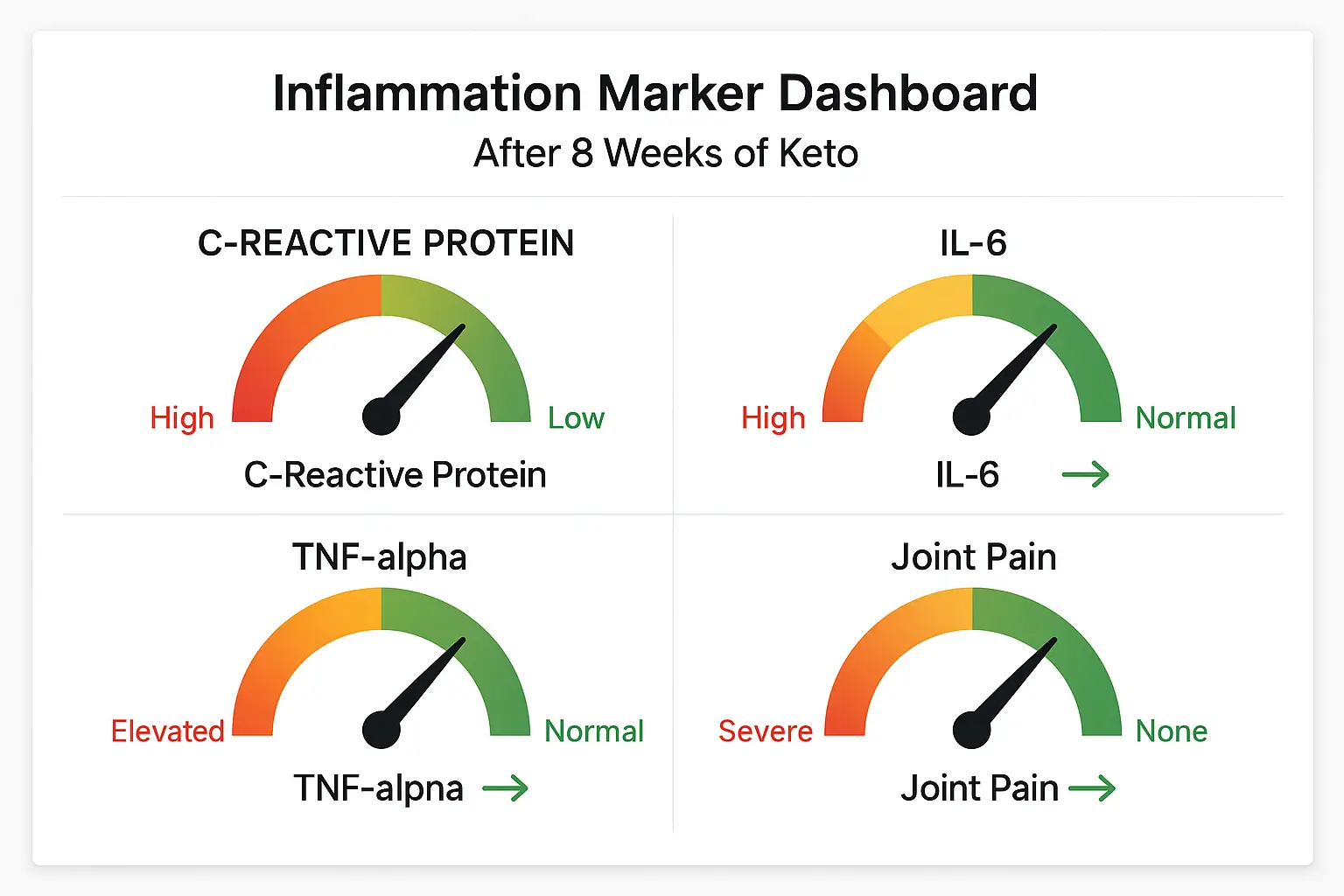
10. Can Improve Acne
Your skin reflects your internal metabolic health, and diet plays a larger role in acne development than previously recognized by dermatologists. The ketogenic diet addresses several root causes of acne formation through hormonal and inflammatory pathways.
High-carbohydrate diets spike insulin and insulin-like growth factor 1 (IGF-1), a hormone similar to insulin that promotes cell growth [34].
These hormones increase sebum (skin oil) production and accelerate skin cell turnover, creating perfect conditions for clogged pores and bacterial growth. Remove the dietary carbohydrates, and these hormone levels normalize within weeks.
Studies reveal clear connections between diet and acne:
- Populations eating traditional low-carbohydrate diets have virtually no acne, even through adolescence [35].
- Dairy products and high-glycemic foods show strong correlations with acne severity in multiple studies [36].
- Low-carbohydrate diets reduce acne lesions by 50% or more in many participants within 12 weeks [37].
People frequently report dramatic skin improvements within three weeks of starting ketogenic diets. The science supports these experiences through multiple mechanisms.
Reduced inflammation throughout the body decreases skin redness and swelling. Balanced hormones normalize oil production. Improved gut health reduces systemic inflammation that can manifest as skin problems.
The diet also naturally increases consumption of skin-supporting nutrients. Omega-3 fatty acids from fish reduce inflammation. Vitamin E from nuts and seeds supports skin repair. Zinc from meat and shellfish helps heal existing acne and prevent scarring.
11. May Benefit Polycystic Ovary Syndrome (PCOS)
PCOS affects one in ten women of reproductive age [38], causing irregular periods, excess hair growth, weight gain, and fertility problems. Insulin resistance drives many PCOS symptoms, making the ketogenic diet a logical therapeutic approach for managing this condition.
A Duke University study followed 11 women with PCOS on a ketogenic diet for six months. The results demonstrated significant improvements [39]:
- Participants lost an average of 12% of their body weight without calorie counting.
- Testosterone levels decreased by 22%, helping normalize hormone balance.
- Fasting insulin dropped by 36%, addressing the root cause of many PCOS symptoms.
- Two previously infertile participants became pregnant during the study period.
The hormonal improvements stem directly from reduced insulin levels. High insulin stimulates ovaries to produce excess testosterone, disrupting normal hormone cycles and causing many PCOS symptoms. Lower insulin allows hormones to rebalance naturally without pharmaceutical intervention.
Women report regular menstrual cycles returning within 2-3 months of starting ketogenic diets. Excess facial and body hair growth slows as testosterone levels normalize.
Energy improves dramatically as blood sugar stabilizes throughout the day. Some achieve pregnancy after years of infertility struggles, though larger studies are needed to confirm fertility benefits.
(Ed. note: While these results are promising, women with PCOS should work with healthcare providers familiar with nutritional interventions for hormonal conditions.)
The diet also addresses PCOS-related metabolic issues including pre-diabetes, high cholesterol, and fatty liver disease. Many women reduce or eliminate medications like metformin and hormonal birth control previously used to manage symptoms.
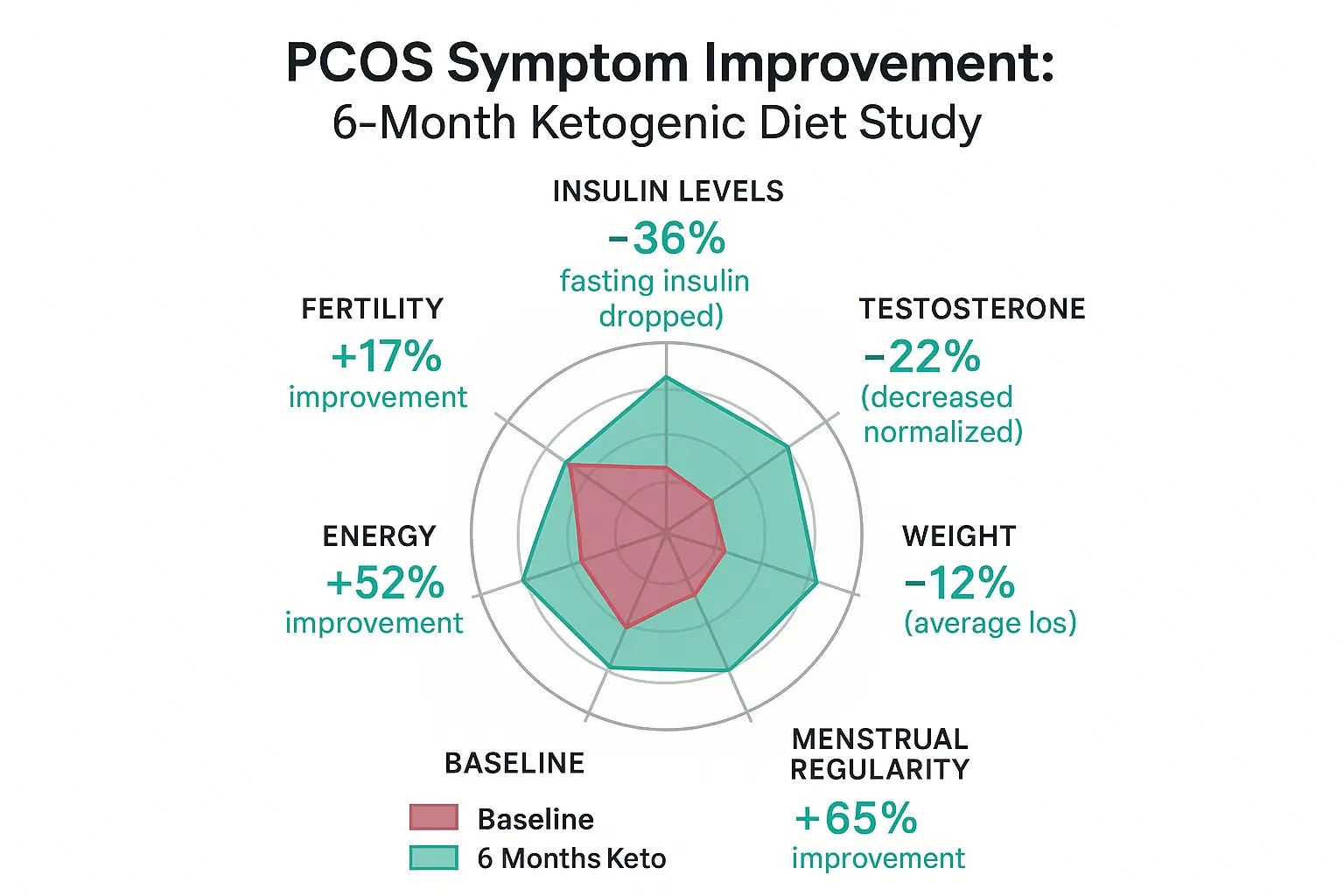
12. Potential in Cancer Therapy
Cancer cells have a metabolic vulnerability that researchers are beginning to exploit therapeutically. Most cancer cells depend heavily on glucose for energy and cannot efficiently use ketones for fuel [40]. This observation led researchers to investigate whether ketogenic diets could support conventional cancer treatment.
The therapeutic theory works like this: you restrict glucose availability while providing ketones that healthy cells can use but many cancer cells cannot process efficiently. This metabolic therapy doesn’t cure cancer independently but may enhance conventional treatments’ effectiveness.
Research shows promising preliminary results in both animal models and human trials:
- Brain tumor patients on ketogenic diets alongside standard treatment showed improved progression-free survival compared to controls in a small pilot study [41].
- The diet enhanced radiation therapy effectiveness in lung and pancreatic cancer models by making cancer cells more vulnerable to treatment [42].
- Quality of life scores improved in advanced cancer patients following supervised ketogenic diets for three months [43].
Major cancer centers now study ketogenic diets as adjunct therapy. Memorial Sloan Kettering, MD Anderson, and the National Cancer Institute run clinical trials examining the diet’s role in cancer treatment protocols.
CRITICAL WARNING: Never attempt cancer treatment with diet alone. The ketogenic diet should only supplement conventional treatment under strict medical supervision. Work closely with your oncology team to determine if this approach suits your specific situation and cancer type.
13. Alleviates Heartburn and Acid Reflux
Gastroesophageal reflux disease (GERD) affects 20% of Americans [44], yet many find complete relief through ketogenic dietary changes. The improvement often occurs within days, surprising both patients and physicians.
A study from the University of North Carolina found that participants following a low-carbohydrate diet for just 10 days experienced complete resolution of GERD symptoms [45]. They required no acid-blocking medications during or after the dietary intervention.
“How can changing my diet eliminate heartburn so quickly?”
The mechanisms aren’t fully understood, but several theories explain the rapid improvement:
- Reduced gas production from bacterial fermentation decreases pressure on the lower esophageal sphincter.
- Elimination of sugars and starches reduces fermentation in the gut that can cause upward pressure.
- Improved stomach acid production and digestive function helps food move through the system more efficiently.
- Reduced inflammation throughout the digestive tract allows proper sphincter function and healing.
People describe the change as remarkable after years of daily antacid use. They experience no heartburn despite consuming foods traditionally considered triggers like coffee, tomatoes, and fatty meals.
The improvement often occurs before significant weight loss, suggesting the mechanism involves more than simply reducing abdominal pressure from excess weight.
Is the Ketogenic Diet Safe for Everyone?
The ketogenic diet isn’t universally appropriate for all individuals. Some people should avoid it entirely, while others need medical supervision to implement it safely. Understanding these limitations helps you make informed decisions about whether this approach suits your situation.
The “keto flu” affects 25-50% of beginners in the first week [46]. Symptoms include headache, fatigue, irritability, and dizziness as your body adapts to using ketones for fuel. You can minimize these transitional effects through proper electrolyte management:
- Increase sodium intake to 3-5 grams daily through sea salt or broth consumption.
- Supplement magnesium (400mg) and potassium (1000mg) to replace losses from increased urination.
- Stay well-hydrated with at least 2.5 liters of water daily to support kidney function.
- Consider gradually reducing carbohydrates over 2-3 weeks rather than dropping suddenly to ease the transition.
Certain medical conditions make the diet inappropriate or require extreme caution:
- Type 1 diabetes carries risk of diabetic ketoacidosis, a dangerous condition requiring immediate medical attention.
- Kidney disease or history of kidney stones may worsen with high protein intake and altered mineral balance.
- Liver disease can impair ketone production and fat metabolism necessary for the diet.
- Gallbladder removal or dysfunction may cause difficulty digesting the high fat content.
- Pregnancy and breastfeeding require adequate carbohydrates for fetal development and milk production.
- Certain rare metabolic disorders prevent proper fat metabolism and make ketosis dangerous.
Nutrient deficiencies can develop without proper planning and food variety. Focus on nutrient-dense whole foods rather than just achieving macronutrient ratios. Include plenty of low-carb vegetables (aim for 7-10 servings daily), quality proteins from various sources, and healthy fats from whole food sources.
“Should I try this diet?”
The answer depends on your individual health status, medications, goals, and ability to sustain the lifestyle change long-term.
Consult a healthcare provider familiar with ketogenic diets, especially if you take medications for diabetes, blood pressure, or other chronic conditions that may require adjustment.
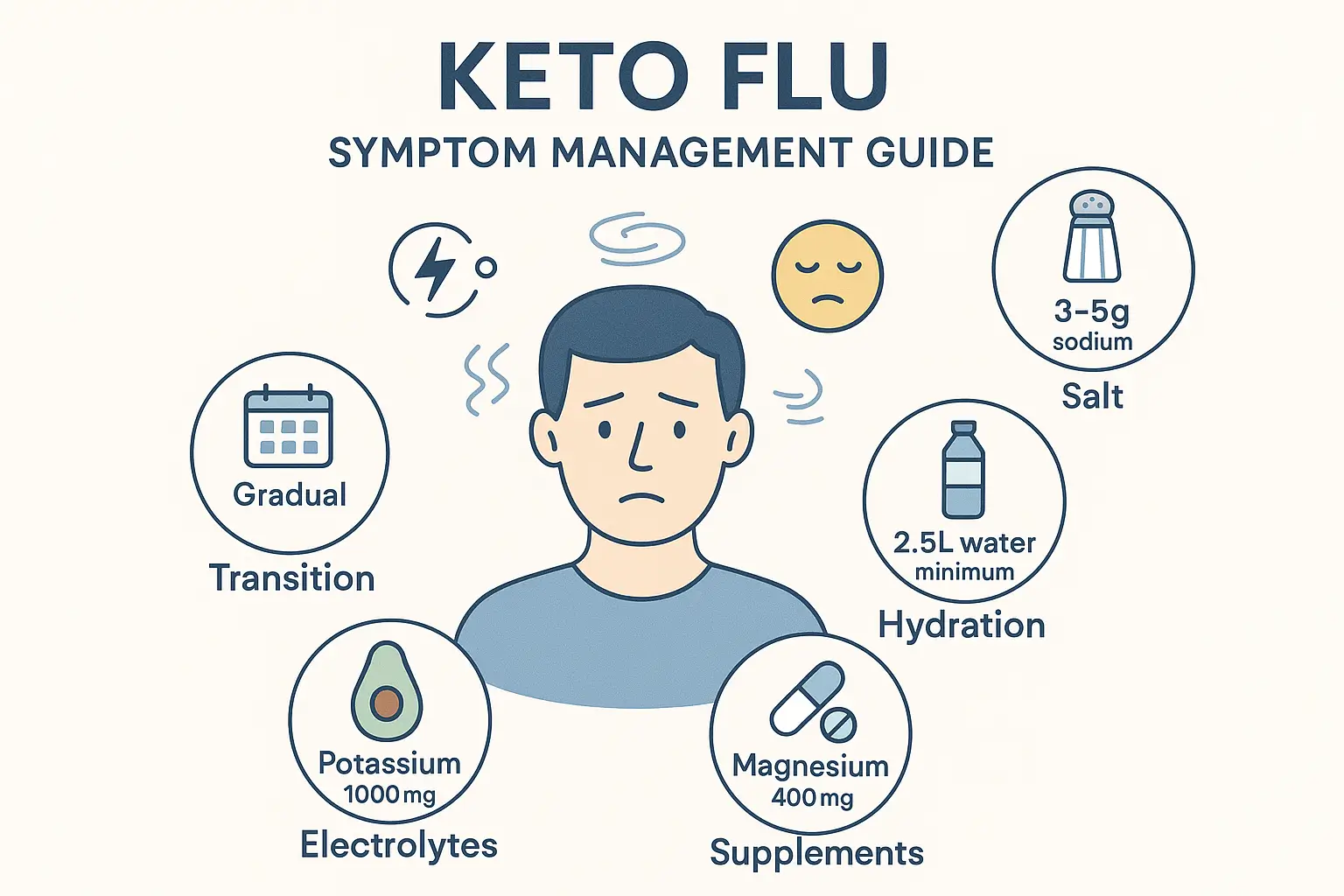
Recommended Keto Diet Recipe Books and Resources
Starting your ketogenic journey requires reliable information and practical meal ideas that fit your lifestyle. These carefully selected resources provide evidence-based guidance and tested recipes to support your success.
Online Resources:
- Diet Doctor (dietdoctor.com) offers free meal plans, recipes, and medical information reviewed by physicians specializing in low-carb nutrition. Their visual guides simplify food choices for beginners, while their recipe database includes over 1,000 ketogenic options with detailed nutritional information and user ratings.
- Ruled.me provides comprehensive macro calculators, shopping lists, and a database of keto-friendly recipes with detailed nutritional breakdowns. Their free starter guide covers everything from ketosis testing methods to troubleshooting common problems, with scientific references supporting all recommendations.
Essential Cookbooks:
The Ketogenic Bible” by Jacob Wilson and Ryan Lowery combines scientific explanations with practical meal plans based on their research at the Applied Science and Performance Institute. The authors, both nutrition researchers, provide evidence-based approaches to implementing and customizing the diet for different goals, from weight loss to athletic performance.
“Simply Keto” by Suzanne Ryan features over 100 recipes from someone who lost 120 pounds following the ketogenic diet. Her focus on simple, family-friendly meals using common ingredients makes keto sustainable for busy households, with most recipes requiring less than 30 minutes of preparation time.
“The Complete Ketogenic Diet for Beginners” by Amy Ramos breaks down the diet into manageable weekly steps with shopping lists and meal prep strategies. The book includes 75 easy recipes requiring minimal ingredients (usually 5 or fewer), perfect for those new to cooking or overwhelmed by complex meal plans.
These resources transform the ketogenic diet from an abstract concept into practical daily habits you can maintain long-term. Choose resources that match your learning style, cooking skills, and time availability for best results.
Making Your Decision
The ketogenic diet offers remarkable health benefits supported by decades of peer-reviewed research. From significant weight loss and improved blood sugar control to enhanced brain function and reduced inflammation, the evidence continues accumulating in major medical journals.
You’ve discovered how this metabolic shift affects multiple body systems simultaneously through interconnected mechanisms. The diet addresses root causes of chronic conditions rather than just managing symptoms. Whether you struggle with excess weight, diabetes, cognitive decline, or inflammatory conditions, ketosis provides a powerful therapeutic tool backed by science.
This approach requires commitment and careful implementation to achieve optimal results. Success depends on understanding both the benefits and limitations while personalizing the approach to your unique situation. Not everyone thrives on very low carbohydrate intake, and some individuals need modifications or alternative approaches altogether.
Your next step involves scheduling a consultation with a healthcare provider knowledgeable about nutritional interventions. Bring this information along with your complete health history, current medications, and specific health goals. Together, you can determine whether the ketogenic diet aligns with your medical needs and lifestyle factors.
The path to improved health through dietary change remains highly individual. What works brilliantly for one person may not suit another due to genetics, health conditions, or lifestyle factors. Armed with scientific knowledge and professional guidance, you can make an informed decision about whether the ketogenic diet belongs in your health transformation journey.
Remember that sustainable health improvements come from long-term lifestyle changes, not temporary diets. If you choose to try the ketogenic approach, commit to giving your body adequate time to adapt (at least 8-12 weeks) while monitoring your progress with appropriate health markers and professional support.
References
- [1] Paoli A, et al. – “Beyond weight loss: a review of the therapeutic uses of very-low-carbohydrate (ketogenic) diets” – European Journal of Clinical Nutrition, 2013
- [2] Masood W, et al. – “Ketogenic Diet” – StatPearls Publishing, 2023
- [3] Wheless JW – “History of the ketogenic diet” – Epilepsia, 2008
- [4] Bueno NB, et al. – “Very-low-carbohydrate ketogenic diet v. low-fat diet for long-term weight loss” – British Journal of Nutrition, 2013
- [5] Kreitzman SN, et al. – “Glycogen storage: illusions of easy weight loss” – American Journal of Clinical Nutrition, 1992
- [6] Santos FL, et al. – “Systematic review and meta-analysis of clinical trials of the effects of low carbohydrate diets on cardiovascular risk factors” – Obesity Reviews, 2012
- [7] Sumithran P, et al. – “Ketosis and appetite-mediating nutrients and hormones after weight loss” – European Journal of Clinical Nutrition, 2013
- [8] Gibson AA, et al. – “Do ketogenic diets really suppress appetite?” – Obesity Reviews, 2015
- [9] Weigle DS, et al. – “A high-protein diet induces sustained reductions in appetite” – American Journal of Clinical Nutrition, 2005
- [10] Westman EC, et al. – “The effect of a low-carbohydrate, ketogenic diet versus a low-glycemic index diet on glycemic control” – Nutrition & Metabolism, 2008
- [11] Hussain TA, et al. – “Effect of low-calorie versus low-carbohydrate ketogenic diet in type 2 diabetes” – Nutrition, 2012
- [12] American Diabetes Association – “Standards of Medical Care in Diabetes” – Diabetes Care, 2021
- [13] Moore JX, et al. – “Metabolic Syndrome Prevalence by Race/Ethnicity and Sex in the United States” – Preventing Chronic Disease, 2017
- [14] Volek JS, et al. – “Carbohydrate restriction has a more favorable impact on the metabolic syndrome” – Lipids in Health and Disease, 2009
- [15] Volek JS, et al. – “Comparison of energy-restricted very low-carbohydrate and low-fat diets” – Nutrition & Metabolism, 2008
- [16] Dashti HM, et al. – “Long-term effects of a ketogenic diet in obese patients” – Experimental & Clinical Cardiology, 2004
- [17] Krauss RM, et al. – “Separate effects of reduced carbohydrate intake and weight loss” – American Journal of Clinical Nutrition, 2006
- [18] Diamond DM, et al. – “Low carbohydrate diet: are concerns with saturated fat, lipids, and cardiovascular disease risk justified?” – Journal of Clinical Lipidology, 2020
- [19] CDC – “Facts About Hypertension” – Centers for Disease Control and Prevention, 2023
- [20] Foster GD, et al. – “A randomized trial of a low-carbohydrate diet for obesity” – New England Journal of Medicine, 2003
- [21] Perez-Guisado J, et al. – “Spanish Ketogenic Mediterranean Diet” – Nutrition Journal, 2008
- [22] Neter JE, et al. – “Influence of weight reduction on blood pressure” – Hypertension, 2003
- [23] Murray AJ, et al. – “Novel ketone diet enhances physical and cognitive performance” – FASEB Journal, 2016
- [24] Krikorian R, et al. – “Dietary ketosis enhances memory in mild cognitive impairment” – Neurobiology of Aging, 2012
- [25] Freeman JM, et al. – “The ketogenic diet: one decade later” – Pediatrics, 2007
- [26] Neal EG, et al. – “The ketogenic diet for the treatment of childhood epilepsy” – Lancet Neurology, 2008
- [27] Phillips MCL, et al. – “Randomized crossover trial of a modified ketogenic diet in Alzheimer’s disease” – Alzheimer’s Research & Therapy, 2021
- [28] Vanitallie TB, et al. – “Treatment of Parkinson disease with diet-induced hyperketonemia” – Neurology, 2005
- [29] Prins ML, et al. – “The collective therapeutic potential of cerebral ketone metabolism” – Journal of Cerebral Blood Flow & Metabolism, 2008
- [30] Brenton JN, et al. – “Pilot study of a ketogenic diet in relapsing-remitting MS” – Neurology Neuroimmunology & Neuroinflammation, 2019
- [31] Youm YH, et al. – “The ketone metabolite β-hydroxybutyrate blocks NLRP3 inflammasome” – Nature Medicine, 2015
- [32] Forsythe CE, et al. – “Comparison of low fat and low carbohydrate diets on circulating fatty acid composition” – Lipids in Health and Disease, 2008
- [33] Goldberg EL, et al. – “Ketogenic diet activates protective γδ T cell responses” – Cell Metabolism, 2019
- [34] Melnik BC – “Linking diet to acne metabolomics, inflammation, and comedogenesis” – Clinical, Cosmetic and Investigational Dermatology, 2015
- [35] Cordain L, et al. – “Acne vulgaris: a disease of Western civilization” – Archives of Dermatology, 2002
- [36] Smith RN, et al. – “The effect of a high-protein, low glycemic-load diet” – International Journal of Dermatology, 2007
- [37] Paoli A, et al. – “Nutrition and acne: therapeutic potential of ketogenic diets” – Skin Pharmacology and Physiology, 2012
- [38] Wolf WM, et al. – “Geographical Prevalence of Polycystic Ovary Syndrome” – Journal of Clinical Endocrinology & Metabolism, 2018
- [39] Mavropoulos JC, et al. – “The effects of a low-carbohydrate, ketogenic diet on PCOS” – Nutrition & Metabolism, 2005
- [40] Klement RJ – “Beneficial effects of ketogenic diets for cancer patients” – BMC Medicine, 2017
- [41] Rieger J, et al. – “ERGO: A pilot study of ketogenic diet in recurrent glioblastoma” – International Journal of Oncology, 2014
- [42] Allen BG, et al. – “Ketogenic diets enhance oxidative stress in lung cancer” – Redox Biology, 2014
- [43] Schmidt M, et al. – “Effects of a ketogenic diet on quality of life in cancer patients” – Nutrition & Metabolism, 2011
- [44] El-Serag HB, et al. – “Update on the epidemiology of gastro-oesophageal reflux disease” – Gut, 2014
- [45] Austin GL, et al. – “A very low-carbohydrate diet improves gastroesophageal reflux” – Digestive Diseases and Sciences, 2006
- [46] Bostock EC, et al. – “Consumer Reports of ‘Keto Flu’ Associated With the Ketogenic Diet” – Frontiers in Nutrition, 2020



